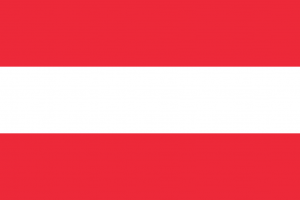Language/German/Culture/Austria-Timeline
Interesting Facts about Austria[edit | edit source]
- Country : AUSTRIA🇦🇹
- Capital: Vienna
- Continent: Europe
- Currency: Euro
- Official Language: German
1. Austria is one of the countries with the highest standard of living in the world.
2. 62% of the country is covered by the Austrian Alps.
3. Austria is the first country to establish national regulations regarding organic farming.
4. Military training is mandatory for all Austrian men and it lasts less than a year.
5. Austria is home to the largest ice cave in the world ( Extends 42 km)
6. The mountain Großglockner (3,798 m) is the country’s highest point.
7. The Grossglockner road crisscrossing the Alps is famous for its hairpin curves and panoramic views of the highest mountains.
8. Skiing has been the most popular sport in Austria.
9. The world-famous Salzburg Festival,1920 is the largest opera and theatre festival in Europe.
10. The Schonbrunn Palace, Vienna has more than 1,441 Rooms.
11. Austria is home to Europe’s tallest Waterfall – the Krimml Waterfalls.
12. Hallstatt, Austria is the most picturesque town known for the oldest salt mines in the world.
13. One of the must-see museums in Vienna is the famous Mozarthaus.
14. Postcards were first published in Austria.
Source[edit source]
- Content Research - Ms Harshali Dhatavkar
➡ To LEARN & SHARE interesting experiences: Join the WhatsApp group
History of Austria[edit | edit source]
The history of Austria is closely linked to that of the Holy Roman Empire. Forming the march of the East and Austria under the Empire Carolingian and Ottonian, its territories erected in duchy in 1156, torn from the King of Bohemia after 1278, gathered and enlarged between the late XIIIth century, and the second half of the XIVth century as possessions of the Hapsburg dynasty.
XIIIth - XVIth centuries[edit | edit source]
With the election of Rudolf, the Habsburg princes acceded for the first time to the Empire in 1273-1291. The Dukes of Austria then extend their possessions before monopolize the imperial crown in the middle of the xv th century.
XVIth - XVIIth centuries[edit | edit source]
The two Spanish (Charles Quint) and Austrian (Ferdinand) branches of the Habsburgs prevail throughout Europe while the long hostility with France sets in. Pushing back the Ottomans, the Austrian monarchy, also champion just like Spain of the Counter-Reformation, strengthens and extends to the east (Hungary, Bohemia).
XVIIIth century[edit | edit source]
After the Treaties of Karlowitz (1699), Passarowitz (1718) and the successes obtained at the end of the War of Austrian Succession (1740-1748), the power of the Habsburgs reached its peak. The reign of Marie-Thérèse (1740-1780) was notably marked by the brilliance of baroque Vienna while her son Joseph II (1780-1790), a supporter of enlightened despotism (Josephism), tried to modernize the imperial institutions.
XIXth century[edit | edit source]
Although Austria returns with the work of Chancellor Metternich, in the foreground in the new post-Napoleonic European equilibrium (Congress of Vienna, 1815), the awakening of nationalities signals the beginning of the decline. If the independence movements in Central Europe were temporarily curbed, the Italian and German units (1860-1870) amputated Austria from a large part of its territories, confining it definitively to Danubian Europe.
XXth century[edit | edit source]
National demands, including those of the South Slavs, however, got the better of the new empire born of the Austro-Hungarian compromise of 1867: it was in Bosnia-Herzegovina, annexed in 1908, that the spark of the First World War broke out. Austria-Hungary will not survive.
World Timelines[edit source]
Videos[edit | edit source]
Summer Course for German Language and Culture in Austria ...[edit | edit source]
Why Are Germany and Austria SEPARATE Nations (history of ...[edit | edit source]
Other Lessons[edit | edit source]

